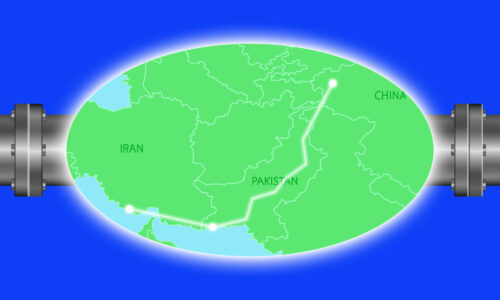Kaiser Kuo: America should stop sneering at China’s Belt and Road initiative
Skepticism is healthy, until you pile on so much of it that any fair appraisal becomes impossible. My worry is that the U.S. is nearing that point.

Just a couple of weeks before the Belt and Road Forum, held in Beijing earlier this month, Sinica Podcast co-host Jeremy Goldkorn and I spoke with Joseph Nye, professor at the Harvard Kennedy School, for our show. We talked about soft power, a term he coined and defined, and for which he’s perhaps best known — about China’s fixation with it, its prospects for augmenting it in the age of Trump, and the decidedly mixed results of its multibillion-dollar investments in soft power projects.
But the parts of our conversation that really struck me were about two “traps” with great salience to the U.S.-China relationship at present.
The first of these is the by-now-familiar Thucydides Trap: the risk of war between an incumbent power and a rising one, named after the great Greek historian of the Peloponnesian War who first observed the mechanism. We spoke about it in relation to Graham Allison’s new book, Destined for War: Can America and China Escape Thucydides’s Trap?
The second, less well known trap that Nye talked about is the Kindleberger Trap, named for Charles Kindleberger, an MIT economist and civil servant who is widely acknowledged to have been the primary architect of the Marshall Plan. (Nye writes about it in this excellent essay). The Kindleberger Trap also looks at the relationship between rising and incumbent powers, but posits that what is essential to avert disaster is the willingness of the rising power to create the sort of public goods that the power in eclipse is no longer able to provide. The reasons for the catastrophes of the 1930s — the global economic depression, the rise of Fascism, the outbreak of World War II and the Holocaust — resulted, Kindleberger suggested, from the failure of the United States to provide the public goods that Great Britain, sapped and demoralized by the Great War, was unable to. The U.S., which emerged from World War I as the world’s most powerful nation, descended instead into what Nye termed “virulent isolationism,” passing, as he noted, the Smoot-Hawley Tariffs, refusing to take part in the London Economic Conference designed to deal with international monetary policy, and acting as a free rider.
Nye clearly believes that for China’s rise to be truly peaceful, it needs to step up and provide public goods — to act, as former U.S. trade representative Robert Zoellick famously termed it, as a “responsible stakeholder.” He cited examples of some areas where China has done well in that regard: ponying up its share of the UN budget, providing troops for UN peacekeeping efforts, and honoring its commitments to the Paris Agreement on climate change. He also noted, though, that China’s refusal to accept the Hague Tribunal’s decision in the case brought against it by the Philippines over China’s claims in the South China Sea was just the opposite.
Jeremy asked him whether we might perhaps see Chinese initiatives like the many projects that fall under Belt and Road as provision of public goods. Nye was noncommittal, but certainly left the door open to the possibility that the infrastructure China has pledged to build in Central Asia, Southeast Asia, the Middle East, and Africa could very well prove to be valuable public goods.
In the weeks since, this exchange has gone through my head many times. I’m increasingly convinced that it’s in the American interest to see what China is now doing through the lens of the Kindleberger Trap, and to help steer China toward provision of public goods by checking our reflexive antagonism.
There are, of course, reasons for skepticism. But there’s no danger, at least among pundits in the West, that anyone has been so beguiled by Xi Jinping’s grand plan that they believe it to be rooted in altruism. Some fret that the debt burden on recipient countries will be crippling. Others see China’s inroads as the thin edge of a neocolonial wedge. Most agree that the Belt and Road brand — and it is, very clearly, a kind of branding exercise — is so capacious that it’s nearly meaningless, and that local officials and SOE bosses can slap the B&R label on any old project. And many Chinese are wary of this largesse when China itself hasn’t even joined the ranks of middle-income countries on a per capita basis. And then there’s the propaganda around the initiative, most of which has been downright silly, some of it risibly so (see this compilation of videos for a few examples).
Skepticism is healthy, until you pile on so much of it that any fair appraisal becomes impossible. My worry is that the U.S. is nearing that point. Already, we’ve blundered in our approach to what might be the most important of the Belt and Road initiatives: the Asia Infrastructure Investment Bank (AIIB). A number of our recent guests on Sinica, including Nye, former U.S. trade representative Charlene Barshefsky, Acting Assistant Secretary of State for East Asia and Pacific Affairs Susan Thornton, and former deputy assistant secretary of state for East Asian and Pacific affairs Susan Shirk, have all spoken of the U.S. effort to dissuade allies from joining AIIB as a mistake. Concerns over governance and lending standards may have been well founded, but the Obama administration’s negativity toward AIIB foreclosed a chance for constructive participation and proved to be a diplomatic embarrassment.
In a recent interview with Nathan Gardels of The World Post, the former Singaporean diplomat Kishore Mahbubani addressed the inevitability of an end to American primacy, urging the U.S. to accept its eventual fate with more grace than it’s shown, and to “abandon its destructive policies of unilateralism and start a new era of constructive policies of multilateralism.” Xi Jinping’s signature initiative offers an opportunity for just such multilateralism. “If the U.S. wants to be really cunning,” Mahbubani said, “it should seize the many business opportunities that the ‘One Belt, One Road’ initiative will eventually offer. Pragmatism and common sense should replace ideology and pride in American thinking of China.”
Sure, Belt and Road might not end up being a “Marshall Plan without a war,” as one analyst called it. Marshall Plan comparisons, though, are ubiquitous — and they are not coming from China. Indeed, China’s official Xinhua News Agency has bluntly rejected the comparison, noting that the Marshall Plan was about Cold War–era containment of Soviet power, whereas China’s Belt and Road initiative “aims at achieving the common development of all countries rather than seeking spheres of political influence.” Perhaps those who have praised Belt and Road as an ingenious way for China’s bloated SOEs to fob off their excess capacity are underestimating the scale of overcapacity, or overestimating Asia’s appetite for new infrastructure. It’s possible, if not indeed likely, that some of the many projects lumped under Belt and Road may prove to be costly boondoggles.
With Charles Kindleberger’s warning firmly in mind, the best response on the part of the U.S. and its allies should be neither to sneer nor to blithely cheer, but to offer constructive guidance and encouragement — and to make sure that, to the highest extent possible, all the roads, rail lines, ports, and pipelines do indeed function as public goods.
Belt and Road would have fared better, as my colleague Jeremy has pointed out, under its original moniker — the “New Silk Road.” That name would have carried a positive historical valence that evokes in particular a historical period from which contemporary China could take real inspiration: the Tang dynasty. Ask any educated Chinese person about that dynasty — one that likely ranks at or near the top of the list of great epochs of Chinese history — and they’ll tell you that the reason for the Tang’s greatness was its openness and cosmopolitanism. Tang is a way for Chinese to reconcile national greatness with internationalism, with globalization. I’m told that this formulation worked for a certain Chinese heavy metal band.
Now if there were only such a period that American leaders could invoke…






